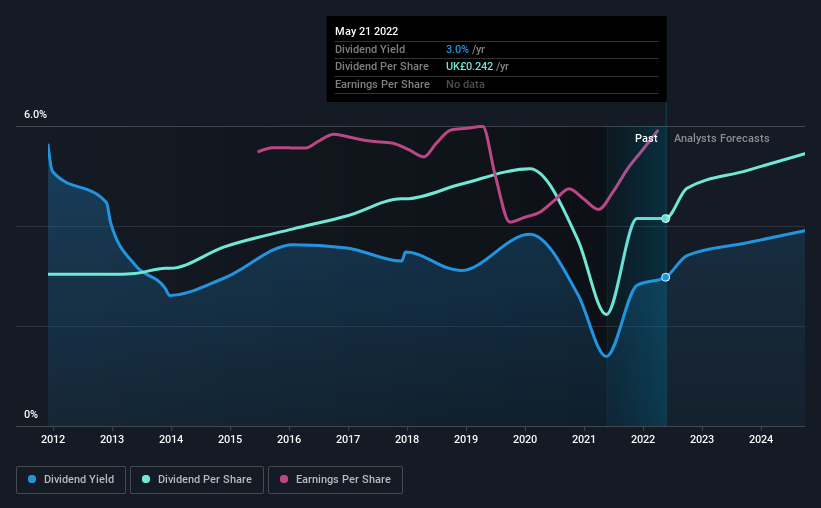Britvic plc (LON:BVIC) Will Pay A UK£0.078 Dividend In Three Days
It looks like Britvic plc (LON:BVIC) is about to go ex-dividend in the next three days. The ex-dividend date is one business day before a company's record date, which is the date on which the company determines which shareholders are entitled to receive a dividend. The ex-dividend date is important as the process of settlement involves two full business days. So if you miss that date, you would not show up on the company's books on the record date. Accordingly, Britvic investors that purchase the stock on or after the 26th of May will not receive the dividend, which will be paid on the 6th of July.
The company's upcoming dividend is UK£0.078 a share, following on from the last 12 months, when the company distributed a total of UK£0.24 per share to shareholders. Last year's total dividend payments show that Britvic has a trailing yield of 3.0% on the current share price of £8.135. We love seeing companies pay a dividend, but it's also important to be sure that laying the golden eggs isn't going to kill our golden goose! So we need to check whether the dividend payments are covered, and if earnings are growing.
View our latest analysis for Britvic
Dividends are typically paid from company earnings. If a company pays more in dividends than it earned in profit, then the dividend could be unsustainable. Britvic paid out 58% of its earnings to investors last year, a normal payout level for most businesses. Yet cash flow is typically more important than profit for assessing dividend sustainability, so we should always check if the company generated enough cash to afford its dividend. Fortunately, it paid out only 41% of its free cash flow in the past year.
It's encouraging to see that the dividend is covered by both profit and cash flow. This generally suggests the dividend is sustainable, as long as earnings don't drop precipitously.
Click here to see the company's payout ratio, plus analyst estimates of its future dividends.
Have Earnings And Dividends Been Growing?
Companies that aren't growing their earnings can still be valuable, but it is even more important to assess the sustainability of the dividend if it looks like the company will struggle to grow. Investors love dividends, so if earnings fall and the dividend is reduced, expect a stock to be sold off heavily at the same time. It's not encouraging to see that Britvic's earnings are effectively flat over the past five years. It's better than seeing them drop, certainly, but over the long term, all of the best dividend stocks are able to meaningfully grow their earnings per share. Earnings per share growth has been slim, and the company is already paying out a majority of its earnings. While there is some room to both increase the payout ratio and reinvest in the business, generally the higher a payout ratio goes, the lower a company's prospects for future growth.
Another key way to measure a company's dividend prospects is by measuring its historical rate of dividend growth. In the last 10 years, Britvic has lifted its dividend by approximately 3.2% a year on average.
The Bottom Line
Is Britvic worth buying for its dividend? It's unfortunate that earnings per share have not grown, and we'd note that Britvic is paying out lower percentage of its cashflow than its profit, but overall the dividend looks well covered by earnings. All things considered, we are not particularly enthused about Britvic from a dividend perspective.
While it's tempting to invest in Britvic for the dividends alone, you should always be mindful of the risks involved. Case in point: We've spotted 2 warning signs for Britvic you should be aware of.
Generally, we wouldn't recommend just buying the first dividend stock you see. Here's a curated list of interesting stocks that are strong dividend payers.
Have feedback on this article? Concerned about the content? Get in touch with us directly. Alternatively, email editorial-team (at) simplywallst.com.
This article by Simply Wall St is general in nature. We provide commentary based on historical data and analyst forecasts only using an unbiased methodology and our articles are not intended to be financial advice. It does not constitute a recommendation to buy or sell any stock, and does not take account of your objectives, or your financial situation. We aim to bring you long-term focused analysis driven by fundamental data. Note that our analysis may not factor in the latest price-sensitive company announcements or qualitative material. Simply Wall St has no position in any stocks mentioned.

 Yahoo Finance
Yahoo Finance 
